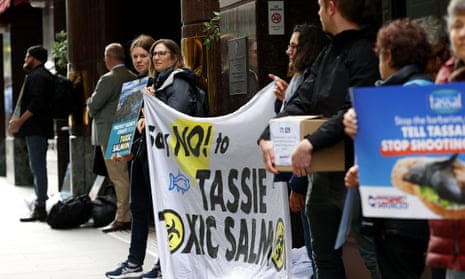Campaigners fear the foreign takeover of Tasmanian salmon farmer Tassal – approved at a shareholder meeting on Thursday morning – will further risk environmentally sensitive shallow waters in the state.
At a company meeting in Melbourne, Tassal shareholders voted strongly in favour of the takeover – reportedly worth $1.7bn – by Canadian salmon producer Cooke Aquaculture.
Earlier this week a global consortium of marine conservation groups wrote to the state premier, Jeremy Rockliff, saying to “be prepared for the worst” if the Cooke takeover was approved.
In an open letter, also printed in ads in three major newspapers, the groups listed a history of environmental controversies from Cooke since the year 2000.
In the highest profile case, Cooke agreed to pay $2.75m after more than 250,000 salmon escaped from a collapsed pen in 2017 north of Seattle.
Outside the Tassal meeting in Melbourne, Bob Brown Foundation fish farm campaigner Alistair Allan said: “Things are only going to get worse for Tasmania when things should be getting better.”
In a notice to the ASX, Tassal said 96% of the company’s shareholders had voted in favour of the takeover from Cooke – a privately owned company.
The takeover sees the last locally owned salmon farmer sold to foreign companies. Last year Brazil-based JBS bought Huon Aquaculture. Petuna was bought by New Zealand-based Sealord in 2020.
Peter George, president of Tasmanian campaign group Neighbours of Fish Farming, said his proxy in the Melbourne meeting had reported the profits promised from the takeover of operations had been too difficult for shareholders to resist.
He said: “This government has no idea what’s going to come and there’s no legislation in place that can deal with an aggressive company like this.”
He said a state government inquiry earlier this year into fish farming recommended a reduction in the use of open-net pens close to shore – a practice he said was unsustainable and was threatening marine life and fur seals due to the pollution from concentrating salmon in the nets.
“As a priority, the open net fish pens need to be taken out,” he said.
after newsletter promotion
George wrote to the Tasmanian government this week saying the state’s EPA was “in no way ready for an aggressive, expansionist farmed salmon giant like Cooke”.
“Cooke will spend millions on lobbying government and politicians, marketing and advertising but will spend nothing and care less for protecting the future of Tasmania’s waterways, marine life, coastal communities and reputation.”
Neighbours of Fish Farming and campaign group SumOfUs took a 171,000-signature to the Melbourne meeting that urged Cooke to resolve a controversy over Tassal’s use of explosives and shotgun pellets to deter fur seals.
SumOfUs campaigner Nish Humphreys said: “With today’s takeover bid rubber-stamped by Tassal shareholders, Cooke not only inherits Tassal’s operations but also the longstanding controversy over its brutal treatment of protected fur seals. Cooke’s first order of business as Tassal’s new owners must be resolving this scandal and ending the use of explosive seal deterrents.”
When Cooke announced the takeover plans in August, the company said its priority would be “to work with other producers and government regulators on continuous environmental improvement plans as well as strengthening supply chain and local community relationships”.
The company says “protecting the ocean has always been essential to our business” and that it sets “the highest standards for responsible harvesting and sustainable processes across all lines of business”.
